Home > Search Results
Search Results
Your search for Climate Act returned 0 categories and 41 links
Links
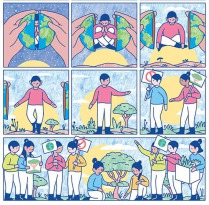
WE CAN CHANGE
What I love about this illustration—and this Op-Ed "How to Stop Freaking Out and Tackle Climate Change"—is that it acknowledges our feelings of despair, fear and powerlessness. It shows us how we can "save" ourselves from depression, helplessness and inaction. It illustrates how we can become a force for good, a force for the positive change we know is possible. We CAN help solve our planetary crises.
Do you often feel stressed, scared, anxious, overwhelmed, depressed by the many serious, life-threatening crises before us? I do. And I know I'm not alone. There are millions of us who are aware of the reality of our climate crisis, the destruction of our democracy, the constant erosion of planetary life-support systems, social inequality, our corrupt political system which continues to favor wealthy individuals and corporations at the expense of the common good and the planet.
We need to promote and encourage awareness in more and more folks. Although awareness can lead to depression. denial and despair, it can also lead to problem-solving, to taking action in our personal lives, and then joining together with others who are working for the common good.
The big takeaway from this Op-Ed for me is that we need to focus on demanding that the government enact enforceable policy that supports and furthers positive change, and as many have put it, "a politics of love." We individuals doing our recycling, switching our light bulbs and buying bamboo toothbrushes is important but isn't going to get the job done.
The time is now for us to BE the change we want to see in the world, DO the change, and DEMAND the change.
"How to Stop Freaking Out and Tackle Climate Change"
Do you often feel stressed, scared, anxious, overwhelmed, depressed by the many serious, life-threatening crises before us? I do. And I know I'm not alone. There are millions of us who are aware of the reality of our climate crisis, the destruction of our democracy, the constant erosion of planetary life-support systems, social inequality, our corrupt political system which continues to favor wealthy individuals and corporations at the expense of the common good and the planet.
We need to promote and encourage awareness in more and more folks. Although awareness can lead to depression. denial and despair, it can also lead to problem-solving, to taking action in our personal lives, and then joining together with others who are working for the common good.
The big takeaway from this Op-Ed for me is that we need to focus on demanding that the government enact enforceable policy that supports and furthers positive change, and as many have put it, "a politics of love." We individuals doing our recycling, switching our light bulbs and buying bamboo toothbrushes is important but isn't going to get the job done.
The time is now for us to BE the change we want to see in the world, DO the change, and DEMAND the change.
"How to Stop Freaking Out and Tackle Climate Change"
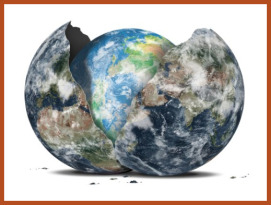
NO GOING BACK TO THE WAY THINGS WERE
It’s a no-brainer that we shouldn’t go back to the way things were. The pandemic has made it clear that it’s the whole system—economic, political and social—that is unhealthy and fails to provide for the common good and the health of the planet. Do we need any more evidence that the way we humans live is unsustainable?
A system that is based on extraction, exploitation and waste by advancing consumerism and growth on a finite planet is stupid. A system that only benefits a few cannot and should not last. Not long ago a correspondent said she wanted “evidence” that corporations were not sustainable. Don’t we all see that production of plastic packaging is filling and killing rivers and the ocean? Did I really need to describe how our current industrial agribusiness depletes and poisons our topsoil and pollutes waterways? Did I need to point out that industrial factory farming meat production likewise pollutes the water and adds methane to the atmosphere, which is worse than CO2, and raises animals in inhumane conditions? Doesn’t everyone know that companies destroy forests to raise more beef and to grow food for those cattle when that corn should be /could be feeding hungry people?
No human being should be hungry! On my weekly grocery shopping trip I pass a Lutheran Church in Santa Fe. At 8 in the morning cars are beginning to park along the side streets and by the time I head home an hour and a half later, those streets are full, lined with dozens of cars as they wait for the church to begin distribution of food boxes. This scene is playing out all over this country. It is an outrage that in the wealthiest country in the world people go hungry, not just because of COVID-19, but all the time. One thing that reveals our failed food system is that food has had to be thrown out right now because there is no way to distribute it to people who need it. Read the “Sickness of Our Food Supply.”
Added to the gross social injustice of food insecurity in the U.S. we should look at the extent of other social ills like extreme poverty, addiction, drug abuse, suicide, depression, racial and wealth inequality.
We must also look at life-destroying environmental injustice: climate change, deforestation, toxic pollution of land and waters, loss of topsoil, plastic pollution, excessive greenhouse gas emissions, destruction of species.
Let’s not overlook political injustice while we’re surveying what doesn’t work. There are way too many issues to deal with here but essentially it has to do with corporate and special interest money running our government. And most recently, in dealing with the pandemic, we see how leadership in this country is playing politics with public safety and human lives. It is unconscionable. This article explains.
So if we don’t want to go back to the way things were, where do we go? Here are a few ideas:
Measure economic progress not by GDP and growth, but by well-being, good and useful jobs, environmental sustainability, happiness, good health, inclusion of everyone. A "New Bottom Line" based on caring, generosity, cooperation and responsibility to the good of all and the Earth.
Build a circular economy and follow the Doughnut Model. Many companies are reinventing themselves in this light.
Improve energy efficiency and further develop renewable energy sources.
Practice conscious consumption: Reduce. Reuse. Repair. Recycle.
Reduce food waste and eat less meat.
Reduce our carbon footprint.
GET MONEY OUT OF POLITICS
Adopt a Global Marshall Plan
CLEAN THE FISH TANK: This refers to the analogy of not just saving the sick fish in our fish tank as we are doing with COVID-19 patients, but let’s clean up our environment and how we practice our lives so that the fish don’t get sick in the first place. It’s like watching dead bodies coming down a river and not bothering to go back upstream to find out why they are dying.
I want to conclude this piece with a quote from Bruce Berlin in his blog “The Struggle for the Soul of America:
This time of reflection led me to ask: How are we doing as a society? Why have we gotten so divided? Why can’t we live together? Why are people so driven to get as much as they can for themselves with no or little concern for how the less fortunate among us who are hurting, hungry, some homeless, are getting by or not?
It’s time for us to take a long, hard look at ourselves and our country. How can we inspire our country to live up to its honored values and highest potential for all Americans? We are in the midst of a spiritual crisis, as well as a health crisis and an economic crisis. Our country is at a moral crossroads: Will we take the highway to a better life for all, or the low road where it’s each one out for one’s self? This is the question we will answer in the fall election. But we can’t wait. Now is the time we must pave the way for a brighter, more equitable society. Read "The Struggle for the Soul of America, Going Within," May 22.
MORE GOOD RESOURCES HERE
A New Bottom Line, by the Network of Spiritual Progressives
Global Marshall Plan, by the Network of Spiritual Progressives
"The Story of Stuff
The Story of Solutions
The Story of Change
A system that is based on extraction, exploitation and waste by advancing consumerism and growth on a finite planet is stupid. A system that only benefits a few cannot and should not last. Not long ago a correspondent said she wanted “evidence” that corporations were not sustainable. Don’t we all see that production of plastic packaging is filling and killing rivers and the ocean? Did I really need to describe how our current industrial agribusiness depletes and poisons our topsoil and pollutes waterways? Did I need to point out that industrial factory farming meat production likewise pollutes the water and adds methane to the atmosphere, which is worse than CO2, and raises animals in inhumane conditions? Doesn’t everyone know that companies destroy forests to raise more beef and to grow food for those cattle when that corn should be /could be feeding hungry people?
No human being should be hungry! On my weekly grocery shopping trip I pass a Lutheran Church in Santa Fe. At 8 in the morning cars are beginning to park along the side streets and by the time I head home an hour and a half later, those streets are full, lined with dozens of cars as they wait for the church to begin distribution of food boxes. This scene is playing out all over this country. It is an outrage that in the wealthiest country in the world people go hungry, not just because of COVID-19, but all the time. One thing that reveals our failed food system is that food has had to be thrown out right now because there is no way to distribute it to people who need it. Read the “Sickness of Our Food Supply.”
Added to the gross social injustice of food insecurity in the U.S. we should look at the extent of other social ills like extreme poverty, addiction, drug abuse, suicide, depression, racial and wealth inequality.
We must also look at life-destroying environmental injustice: climate change, deforestation, toxic pollution of land and waters, loss of topsoil, plastic pollution, excessive greenhouse gas emissions, destruction of species.
Let’s not overlook political injustice while we’re surveying what doesn’t work. There are way too many issues to deal with here but essentially it has to do with corporate and special interest money running our government. And most recently, in dealing with the pandemic, we see how leadership in this country is playing politics with public safety and human lives. It is unconscionable. This article explains.
So if we don’t want to go back to the way things were, where do we go? Here are a few ideas:
Measure economic progress not by GDP and growth, but by well-being, good and useful jobs, environmental sustainability, happiness, good health, inclusion of everyone. A "New Bottom Line" based on caring, generosity, cooperation and responsibility to the good of all and the Earth.
Build a circular economy and follow the Doughnut Model. Many companies are reinventing themselves in this light.
Improve energy efficiency and further develop renewable energy sources.
Practice conscious consumption: Reduce. Reuse. Repair. Recycle.
Reduce food waste and eat less meat.
Reduce our carbon footprint.
GET MONEY OUT OF POLITICS
Adopt a Global Marshall Plan
CLEAN THE FISH TANK: This refers to the analogy of not just saving the sick fish in our fish tank as we are doing with COVID-19 patients, but let’s clean up our environment and how we practice our lives so that the fish don’t get sick in the first place. It’s like watching dead bodies coming down a river and not bothering to go back upstream to find out why they are dying.
I want to conclude this piece with a quote from Bruce Berlin in his blog “The Struggle for the Soul of America:
This time of reflection led me to ask: How are we doing as a society? Why have we gotten so divided? Why can’t we live together? Why are people so driven to get as much as they can for themselves with no or little concern for how the less fortunate among us who are hurting, hungry, some homeless, are getting by or not?
It’s time for us to take a long, hard look at ourselves and our country. How can we inspire our country to live up to its honored values and highest potential for all Americans? We are in the midst of a spiritual crisis, as well as a health crisis and an economic crisis. Our country is at a moral crossroads: Will we take the highway to a better life for all, or the low road where it’s each one out for one’s self? This is the question we will answer in the fall election. But we can’t wait. Now is the time we must pave the way for a brighter, more equitable society. Read "The Struggle for the Soul of America, Going Within," May 22.
MORE GOOD RESOURCES HERE
A New Bottom Line, by the Network of Spiritual Progressives
Global Marshall Plan, by the Network of Spiritual Progressives
"The Story of Stuff
The Story of Solutions
The Story of Change
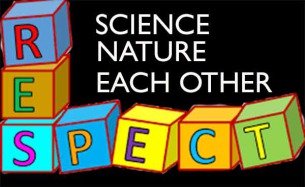
RESPECT SCIENCE, NATURE AND EACH OTHER
What would our world look like if we all respected science, nature and each other? What is it that prevents us from such respect? What is it that keeps us from respect for science and nature? For one thing, as former Vice President Al Gore said, it’s an “inconvenient truth” to acknowledge that how we are living is causing great harm to our home planet, ourselves and all life. Ultimately it boils down to too many people consuming too many things. It is more than a little inconvenient to change our lifestyles, behaviors and consumption habits!
Let’s look at what’s happened with regard to the pandemic. It’s clear that if leadership in the U.S. had respect for science and had followed the guidelines of health professionals, epidemiologists and scientists we would have saved many thousands of lives. The leadership of the United States largely ignored the directives of science regarding COVID and now we have more cases and deaths than any country in the world.
As Thomas Freidman said in this Op Ed, “And remember, as bad as this pandemic is, it's just training wheels for the big, irreversible atmospheric pandemic: climate change.” We have so much evidence of what excessive carbon emissions is doing to our climate, to our planet, to life on Earth, that it is impossible to dismiss. As Paul Hawken of Project Drawdown says, “Science is not a belief system.”The facts are that climate change has caused and / or contributed to hundreds of natural disasters and huge disruptions in normal weather patterns, including the reality that 100.4 degrees F was recorded above the Arctic Circle on June 20! I could go on and on about the destruction we are wreaking on our Earth and all life with our lifestyles by not respecting science and nature.
What about respect for each other? Would there be the hatred, the violence, the war, the abuse, the oppression, the disdain for our fellow beings if we had respect for each other? What keeps us from respecting each other? The capitalist system has trained us to be in it for ourselves, to not care about the effect of our actions on anyone or anything else. We are trained to believe that we must rely only on our own cleverness, determination and capabilities. We climb ladders at the expense of others. What is important is to obtain as much money, power and stuff as possible. That is what counts in this culture. It would indeed be very inconvenient to transform that core belief and system to embrace “a new bottom line,” as Rabbi Michael Lerner puts it: a culture of cooperation, generosity, sharing and love.
We must see ourselves not as separate from each other but as members of our common human family, living in a common home. We can and must do this.
Let’s look at what’s happened with regard to the pandemic. It’s clear that if leadership in the U.S. had respect for science and had followed the guidelines of health professionals, epidemiologists and scientists we would have saved many thousands of lives. The leadership of the United States largely ignored the directives of science regarding COVID and now we have more cases and deaths than any country in the world.
As Thomas Freidman said in this Op Ed, “And remember, as bad as this pandemic is, it's just training wheels for the big, irreversible atmospheric pandemic: climate change.” We have so much evidence of what excessive carbon emissions is doing to our climate, to our planet, to life on Earth, that it is impossible to dismiss. As Paul Hawken of Project Drawdown says, “Science is not a belief system.”The facts are that climate change has caused and / or contributed to hundreds of natural disasters and huge disruptions in normal weather patterns, including the reality that 100.4 degrees F was recorded above the Arctic Circle on June 20! I could go on and on about the destruction we are wreaking on our Earth and all life with our lifestyles by not respecting science and nature.
What about respect for each other? Would there be the hatred, the violence, the war, the abuse, the oppression, the disdain for our fellow beings if we had respect for each other? What keeps us from respecting each other? The capitalist system has trained us to be in it for ourselves, to not care about the effect of our actions on anyone or anything else. We are trained to believe that we must rely only on our own cleverness, determination and capabilities. We climb ladders at the expense of others. What is important is to obtain as much money, power and stuff as possible. That is what counts in this culture. It would indeed be very inconvenient to transform that core belief and system to embrace “a new bottom line,” as Rabbi Michael Lerner puts it: a culture of cooperation, generosity, sharing and love.
We must see ourselves not as separate from each other but as members of our common human family, living in a common home. We can and must do this.
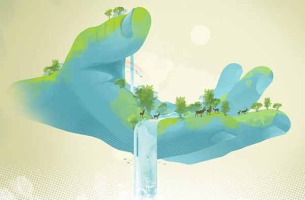
THE EARTH AND AMERICA ARE IN OUR HANDS
If you are like me, you are often undone or overwhelmed by the bad news on so many fronts. Staying positive and not becoming engulfed by despair, depression, outrage, disbelief or grief is a full-time job. The suffering that is going on right now is huge. So I want to share some thoughts and wisdom from two people I have great respect for as support and encouragement in these difficult times. One is author and activist Rebecca Solnit. The other is Father Richard Rohr of the Center for Action and Contemplation. I hope they will help you stay calm, positive and active in the coming months. I encourage you to read the full text from Fr. Rohr. It is wise and provocative, especially his advice at the end which I only paraphrase.
Rebecca Solnit on Hope and Action:
"Listen, I know most of you are heartsore and weary, and the past four years have been a long rough road, and those of us in the west can find dismay just by looking out the window today, but don’t stop now. The election matters, what we do matters, including for climate change, and we can do some things to address the many layers of suffering around us, and if we can we must. . . . We have more to do, and doing it is itself a way to assuage despair, misery, fear. Hope is a discipline, Marianne Kaba said, and it matters most when it’s hardest. Right now it doesn’t mean envisioning rosy futures; It means knowing that the worst case scenarios are not inevitable, and every day we are choosing together what direction we head in.
"It’s important to say what hope is not: it is not a belief that everything was, is, or will be fine. The evidence is all around us of tremendous suffering and tremendous destruction. The hope I’m interested in is about broad perspectives with specific possibilities, ones that invite or demand that we act. . . Hope locates itself in the premises that we don’t know what will happen and that in the spaciousness of uncertainty, you recognize that you may be able to influence the outcomes—you alone or you in concert with a few dozen or several million others. Hope is an embrace of the unknown and the unknowable, an alternative to the certainty of both optimists and pessimists. Optimists think it will all be fine without our involvement; pessimists take the opposite position; both excuse themselves from acting."
Fr. Richard Rohr offers three verses as sources of guidance and commentary for these times.
The first writing is by Etty Hillesum who was killed in Auschwitz in 1943.
"There is a really deep well inside me. And in it dwells God. Sometimes I am there, too. . . And that is all we can manage these days and also all that really matters: that we safeguard that little piece of You, God, in ourselves."
Then, Psalm 62:5-9
In God alone is my soul at rest.
God is the source of my hope.
In God I find shelter, my rock, and my safety.
Men are but a puff of wind,
Men who think themselves important are a delusion.
Put them on a scale,
They are gone in a puff of wind.
And lastly, W.B. Yeats poem, "The Second Coming."
Turning and turning in the widening gyre
The falcon cannot hear the falconer;
Things fall apart; the centre cannot hold;
Mere anarchy is loosed upon the world,
The blood-dimmed tide is loosed, and everywhere
The ceremony of innocence is drowned;
The best lack all conviction, while the worst
Are full of passionate intensity.
Fr. Rohr's full commentary on these verses as they relate to our times is well worth reflecting on. Briefly, his final guidance is that we limit our intake of news, which has become increasingly speculative and hysterical. It will, he says, "tear us apart." Instead we should focus our energies on what we can do to contribute positive thought and action in these next months.
Another useful bit of advice I read was how anxiety breeds a sense of powerlessness, so our best counter to that is . . . DO SOMETHING.
Read the full text from Fr. Rohr here: Some simple but urgent guidance to get us through these next months
(Image courtesy of YES! magazine.)
Rebecca Solnit on Hope and Action:
"Listen, I know most of you are heartsore and weary, and the past four years have been a long rough road, and those of us in the west can find dismay just by looking out the window today, but don’t stop now. The election matters, what we do matters, including for climate change, and we can do some things to address the many layers of suffering around us, and if we can we must. . . . We have more to do, and doing it is itself a way to assuage despair, misery, fear. Hope is a discipline, Marianne Kaba said, and it matters most when it’s hardest. Right now it doesn’t mean envisioning rosy futures; It means knowing that the worst case scenarios are not inevitable, and every day we are choosing together what direction we head in.
"It’s important to say what hope is not: it is not a belief that everything was, is, or will be fine. The evidence is all around us of tremendous suffering and tremendous destruction. The hope I’m interested in is about broad perspectives with specific possibilities, ones that invite or demand that we act. . . Hope locates itself in the premises that we don’t know what will happen and that in the spaciousness of uncertainty, you recognize that you may be able to influence the outcomes—you alone or you in concert with a few dozen or several million others. Hope is an embrace of the unknown and the unknowable, an alternative to the certainty of both optimists and pessimists. Optimists think it will all be fine without our involvement; pessimists take the opposite position; both excuse themselves from acting."
Fr. Richard Rohr offers three verses as sources of guidance and commentary for these times.
The first writing is by Etty Hillesum who was killed in Auschwitz in 1943.
"There is a really deep well inside me. And in it dwells God. Sometimes I am there, too. . . And that is all we can manage these days and also all that really matters: that we safeguard that little piece of You, God, in ourselves."
Then, Psalm 62:5-9
In God alone is my soul at rest.
God is the source of my hope.
In God I find shelter, my rock, and my safety.
Men are but a puff of wind,
Men who think themselves important are a delusion.
Put them on a scale,
They are gone in a puff of wind.
And lastly, W.B. Yeats poem, "The Second Coming."
Turning and turning in the widening gyre
The falcon cannot hear the falconer;
Things fall apart; the centre cannot hold;
Mere anarchy is loosed upon the world,
The blood-dimmed tide is loosed, and everywhere
The ceremony of innocence is drowned;
The best lack all conviction, while the worst
Are full of passionate intensity.
Fr. Rohr's full commentary on these verses as they relate to our times is well worth reflecting on. Briefly, his final guidance is that we limit our intake of news, which has become increasingly speculative and hysterical. It will, he says, "tear us apart." Instead we should focus our energies on what we can do to contribute positive thought and action in these next months.
Another useful bit of advice I read was how anxiety breeds a sense of powerlessness, so our best counter to that is . . . DO SOMETHING.
Read the full text from Fr. Rohr here: Some simple but urgent guidance to get us through these next months
(Image courtesy of YES! magazine.)
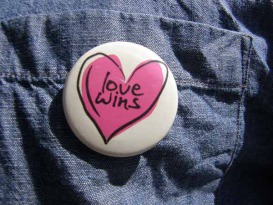
Martin Luther King’s famous quote, “The arc of the moral universe is long, but it bends toward justice,” is right for this moment and something we can carry with us every day because we always need to be working for love and justice.
Our Election Day is November 3. As this video beautifully points out, “Character is on the ballot. Compassion is on the ballot. Decency is on the ballot. Democracy is on the ballot. Justice is on the ballot. Who we want to be is on the ballot.” These things are not just on the ballot November 3. They are on the ballot of our lives every day.
It is pointed out by many that this is a long-term struggle to regain the health of our democracy . . . and our planet. Corruption, corporate power, greed and control, white supremacy, racism, wealth inequality, environmental destruction and injustice all around will not end no matter who our next president is.
I believe we are all coming to grips with the reality that every one of us is a citizen of this country and our planet, and citizenship requires involvement in some way—for the health of our community, our local region, city and state, our nation, our Earth. We must choose what we can do that fits our temperament, our time, our interests and our skills. We must choose to be active citizens.
I want to return to what Rebecca Solnit teaches about hope and action.
“Listen, I know most of you are heartsore and weary, and the past four years have been a long rough road, and those of us in the west can find dismay just by looking out the window today, [during the California fires] but don’t stop now. The election matters, what we do matters, including for climate change, and we can do some things to address the many layers of suffering around us, and if we can we must. . . . We have more to do, and doing it is itself a way to assuage despair, misery, fear. Hope is a discipline, Marianne Kaba said, and it matters most when it’s hardest. Right now it doesn’t mean envisioning rosy futures. It means knowing that the worst case scenarios are not inevitable, and every day we are choosing together what direction we head in.
"It’s important to say what hope is not: it is not a belief that everything was, is, or will be fine. The evidence is all around us of tremendous suffering and tremendous destruction. The hope I’m interested in is about broad perspectives with specific possibilities, ones that invite or demand that we act. . . . Hope locates itself in the premises that we don’t know what will happen and that in the spaciousness of uncertainty, you recognize that you may be able to influence the outcomes—you alone or you in concert with a few dozen or several million others. Hope is an embrace of the unknown and the unknowable, an alternative to the certainty of both optimists and pessimists. Optimists think it will all be fine without our involvement; pessimists take the opposite position; both excuse themselves from acting."
Love Wins!
"Justice is what love looks like in public."
—Cornel West
Our Election Day is November 3. As this video beautifully points out, “Character is on the ballot. Compassion is on the ballot. Decency is on the ballot. Democracy is on the ballot. Justice is on the ballot. Who we want to be is on the ballot.” These things are not just on the ballot November 3. They are on the ballot of our lives every day.
It is pointed out by many that this is a long-term struggle to regain the health of our democracy . . . and our planet. Corruption, corporate power, greed and control, white supremacy, racism, wealth inequality, environmental destruction and injustice all around will not end no matter who our next president is.
I believe we are all coming to grips with the reality that every one of us is a citizen of this country and our planet, and citizenship requires involvement in some way—for the health of our community, our local region, city and state, our nation, our Earth. We must choose what we can do that fits our temperament, our time, our interests and our skills. We must choose to be active citizens.
I want to return to what Rebecca Solnit teaches about hope and action.
“Listen, I know most of you are heartsore and weary, and the past four years have been a long rough road, and those of us in the west can find dismay just by looking out the window today, [during the California fires] but don’t stop now. The election matters, what we do matters, including for climate change, and we can do some things to address the many layers of suffering around us, and if we can we must. . . . We have more to do, and doing it is itself a way to assuage despair, misery, fear. Hope is a discipline, Marianne Kaba said, and it matters most when it’s hardest. Right now it doesn’t mean envisioning rosy futures. It means knowing that the worst case scenarios are not inevitable, and every day we are choosing together what direction we head in.
"It’s important to say what hope is not: it is not a belief that everything was, is, or will be fine. The evidence is all around us of tremendous suffering and tremendous destruction. The hope I’m interested in is about broad perspectives with specific possibilities, ones that invite or demand that we act. . . . Hope locates itself in the premises that we don’t know what will happen and that in the spaciousness of uncertainty, you recognize that you may be able to influence the outcomes—you alone or you in concert with a few dozen or several million others. Hope is an embrace of the unknown and the unknowable, an alternative to the certainty of both optimists and pessimists. Optimists think it will all be fine without our involvement; pessimists take the opposite position; both excuse themselves from acting."
Love Wins!
"Justice is what love looks like in public."
—Cornel West
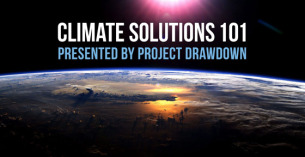
Climate Solutions
Suppose there wasn’t a climate problem at all? Despite the abundant evidence, there are many of us who consider climate change to be a hoax perpetrated by. . . . the Chinese, the Democrats, whomever. It doesn’t really matter.
You may not believe in climate change, but for the moment let’s put aside the reality that science is not a belief system. Let’s just say for the sake of argument that you don’t go along with the climate change crisis or global warming. But suppose you took a look at the Project Drawdown website and at the 100+ solutions (even though you don’t believe we have a problem). Is there any reason why you would not support the projects, innovations, changes and proposals that are presented there since they add jobs, help the economy, eliminate waste of all kinds, save money, and increase efficiency in various industries. What if these projects bring us clean water, clean air, healthy food and soil?
So if you like all the solutions to the problem—or non-problem—there are many ways we can bring about a healthier world for everyone and Nature. We can start anywhere. The most obvious place is right in front of us at every meal—the food we eat. We can buy organic, local food where possible. We can eat a more plant-based diet and waste as little food as possible. Beyond that, we can plant trees and protest deforestation. We can encourage legislative policy that develops more clean energy. If we have the means we can donate to organizations that work in all these areas. One of or favorites is Stand for Trees, a group that works to protect endangered forests all over the world.
Start anywhere. Just start. Depending on your view, we have nothing—and everything—to lose.
“To act, we humans don’t need certainty of success. What we do need is to see others like ourselves in action and to glimpse even a possibility that we can make a difference.” —Frances Moore Lappe´
You may not believe in climate change, but for the moment let’s put aside the reality that science is not a belief system. Let’s just say for the sake of argument that you don’t go along with the climate change crisis or global warming. But suppose you took a look at the Project Drawdown website and at the 100+ solutions (even though you don’t believe we have a problem). Is there any reason why you would not support the projects, innovations, changes and proposals that are presented there since they add jobs, help the economy, eliminate waste of all kinds, save money, and increase efficiency in various industries. What if these projects bring us clean water, clean air, healthy food and soil?
So if you like all the solutions to the problem—or non-problem—there are many ways we can bring about a healthier world for everyone and Nature. We can start anywhere. The most obvious place is right in front of us at every meal—the food we eat. We can buy organic, local food where possible. We can eat a more plant-based diet and waste as little food as possible. Beyond that, we can plant trees and protest deforestation. We can encourage legislative policy that develops more clean energy. If we have the means we can donate to organizations that work in all these areas. One of or favorites is Stand for Trees, a group that works to protect endangered forests all over the world.
Start anywhere. Just start. Depending on your view, we have nothing—and everything—to lose.
“To act, we humans don’t need certainty of success. What we do need is to see others like ourselves in action and to glimpse even a possibility that we can make a difference.” —Frances Moore Lappe´
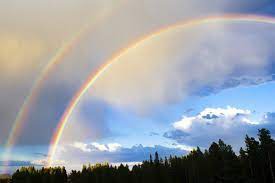
Democracy, Climate Change and Active Hope
The critical state of American democracy and the climate crisis have many people feeling despair, frustration, outrage and a sense of urgency.
The threat to our democracy and the crisis of climate change are most pressing for me though there are many social problems that are also critical.
Where do we find hope? How do we keep going? Jane Goodall has always been an inspiration to me and here are parts of an interview with her that help keep me going. The interviewer comments on the prevalence of negative stories that bring out fear and anger. He asks Jane if those are useful emotions to tap into. She replies, "No. It’s one of my big complaints when I talk to the media: Yes, we absolutely need to know all the doom and gloom because we are approaching a crossroads, and if we don’t take action it could be too late. But traveling the world I’d see so many projects of restoration, animal and plant species being rescued from the brink of extinction, people tackling what seemed impossible and not giving up. Those are the stories that should have equal time, because they’re what gives people hope. If you don’t have hope, why bother? Why should I bother to think about my ecological footprint if I don’t think that what I do is going to make a difference? Why not eat, drink and be merry, for tomorrow we die?"
When asked about "retiring," she replies, "I have to go on doing [my work] because I care passionately about nature. I care passionately about children. If I didn’t make a difference, I wouldn’t do it. I don’t say that to brag. It’s just that every day people say: 'I read your book and I changed. I heard your lecture and I changed.' So if I care, then I can’t stop."
Clearly she knows we each make a difference. Whatever problem we address we can make a difference. As someone has said, "Despair is not an option."
Another inspiring teacher and activist, Joanna Macy, author of Active Hope, puts it this way: "Active Hope is a practice; it is something we do rather than have. First, we take a clear view of reality; second, we identify what we hope for in terms of the direction we'd like things to move; and third, we take steps to move ourselves or our situation in that direction. An action that might seem inconsequential by itself adds to and interfaces with other actions in ways that contribute to a much bigger picture of change."
As planetary citizens we are each called to some action and work that contributes to the common good. Our task is to follow our heart to the action that fits for us, and then engage.
To help myself out of a time of depression and despair I often imagine myself on my deathbed. I want to be able to feel that I have done everything I can to help create a better world. And then even if I am feeling gloomy I get up and go about my day with as much good cheer and balance as I can muster. Doing something usually makes me feel better.
Remember Margaret Meade's famous quote: "NEVER DOUBT that a small group of thoughtful, committed citizens can change the world. Indeed, it is the only thing that ever has."
Here's an excellent blog by author Bruce Berlin which addresses the "monumental challenges" we face, and how we can engage without losing "our health or our minds." "The Struggle for the Soul of America
Here's my newsletter on Active Hope for more on this topic
The threat to our democracy and the crisis of climate change are most pressing for me though there are many social problems that are also critical.
Where do we find hope? How do we keep going? Jane Goodall has always been an inspiration to me and here are parts of an interview with her that help keep me going. The interviewer comments on the prevalence of negative stories that bring out fear and anger. He asks Jane if those are useful emotions to tap into. She replies, "No. It’s one of my big complaints when I talk to the media: Yes, we absolutely need to know all the doom and gloom because we are approaching a crossroads, and if we don’t take action it could be too late. But traveling the world I’d see so many projects of restoration, animal and plant species being rescued from the brink of extinction, people tackling what seemed impossible and not giving up. Those are the stories that should have equal time, because they’re what gives people hope. If you don’t have hope, why bother? Why should I bother to think about my ecological footprint if I don’t think that what I do is going to make a difference? Why not eat, drink and be merry, for tomorrow we die?"
When asked about "retiring," she replies, "I have to go on doing [my work] because I care passionately about nature. I care passionately about children. If I didn’t make a difference, I wouldn’t do it. I don’t say that to brag. It’s just that every day people say: 'I read your book and I changed. I heard your lecture and I changed.' So if I care, then I can’t stop."
Clearly she knows we each make a difference. Whatever problem we address we can make a difference. As someone has said, "Despair is not an option."
Another inspiring teacher and activist, Joanna Macy, author of Active Hope, puts it this way: "Active Hope is a practice; it is something we do rather than have. First, we take a clear view of reality; second, we identify what we hope for in terms of the direction we'd like things to move; and third, we take steps to move ourselves or our situation in that direction. An action that might seem inconsequential by itself adds to and interfaces with other actions in ways that contribute to a much bigger picture of change."
As planetary citizens we are each called to some action and work that contributes to the common good. Our task is to follow our heart to the action that fits for us, and then engage.
To help myself out of a time of depression and despair I often imagine myself on my deathbed. I want to be able to feel that I have done everything I can to help create a better world. And then even if I am feeling gloomy I get up and go about my day with as much good cheer and balance as I can muster. Doing something usually makes me feel better.
Remember Margaret Meade's famous quote: "NEVER DOUBT that a small group of thoughtful, committed citizens can change the world. Indeed, it is the only thing that ever has."
Here's an excellent blog by author Bruce Berlin which addresses the "monumental challenges" we face, and how we can engage without losing "our health or our minds." "The Struggle for the Soul of America
Here's my newsletter on Active Hope for more on this topic
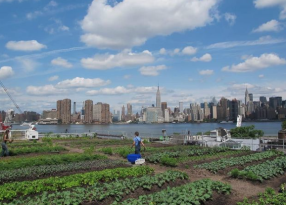
Food and Climate Change
Can industrial agriculture provide food for our growing world population without grossly contributing to climate change? I believe the answer is no.
Current ways of producing food account for 24% of our CO2 emissions, which is equal to the amount coming from the generation of electricity. The main sources of greenhouse gas emissions related to agriculture are from deforestation (for animal use and animal food production and palm oil), methane emissions from cows, nitrous oxide released from fertilizer, transportation and food waste.
There are ways to draw down these emissions.
1) We can adopt regenerative farming practices to build soil health and sequester carbon. Industrial agriculture notoriously uses enormous amounts of energy and toxic chemicals that are degrading and depleting arable soul. It is estimated that we have 60 years of farmable soil left if this degradation continues.
2) We can eat a more plant-based diet, and eat less meat.
3) We can protect our ecosystems and stop burning our forests.
4) We can support local food growing operations.
5) We can rethink our global economy. Did you know that it is common practice for fish caught in Norway or Ireland to be shipped to China for deboning, and then shipped back to those countries for sale? This is “Insane Trade.” Read this Factsheet from Local Futures which describes this wasteful, insane practice.
Check out my September newsletter for descriptions of urban farms, food parks and community gardens that exist all over the world. The goal is common to all of them: to provide healthy food to local communities, foster environmental and economic resilience, be models for sustainable agriculture, and create natural spaces for urban dwellers.
For an excellent brief description of how our current food practices adversely impact our climate, look at Climate Solutions 101,Unit 3, Reducing Sources, starting at minute 8:10 through 13:06. The whole program is clear about the problems, and the solutions, but this portion applies specifically to food. It’s worth your time to watch the whole course.
Solutions abound. Let’s muster the will and courage to make change!
Current ways of producing food account for 24% of our CO2 emissions, which is equal to the amount coming from the generation of electricity. The main sources of greenhouse gas emissions related to agriculture are from deforestation (for animal use and animal food production and palm oil), methane emissions from cows, nitrous oxide released from fertilizer, transportation and food waste.
There are ways to draw down these emissions.
1) We can adopt regenerative farming practices to build soil health and sequester carbon. Industrial agriculture notoriously uses enormous amounts of energy and toxic chemicals that are degrading and depleting arable soul. It is estimated that we have 60 years of farmable soil left if this degradation continues.
2) We can eat a more plant-based diet, and eat less meat.
3) We can protect our ecosystems and stop burning our forests.
4) We can support local food growing operations.
5) We can rethink our global economy. Did you know that it is common practice for fish caught in Norway or Ireland to be shipped to China for deboning, and then shipped back to those countries for sale? This is “Insane Trade.” Read this Factsheet from Local Futures which describes this wasteful, insane practice.
Check out my September newsletter for descriptions of urban farms, food parks and community gardens that exist all over the world. The goal is common to all of them: to provide healthy food to local communities, foster environmental and economic resilience, be models for sustainable agriculture, and create natural spaces for urban dwellers.
For an excellent brief description of how our current food practices adversely impact our climate, look at Climate Solutions 101,Unit 3, Reducing Sources, starting at minute 8:10 through 13:06. The whole program is clear about the problems, and the solutions, but this portion applies specifically to food. It’s worth your time to watch the whole course.
Solutions abound. Let’s muster the will and courage to make change!

WHOA! "CODE RED FOR HUMANITY"
The Intergovernmental Panel on Climate Change (IPCC) has issued a new and dire warning that unless we immediately make big changes to how we do business in the world we will face ever more climate-related catastrophes.
The message is that it's time to act. It's time to put massive amounts of pressure on government to make policies to limit such disasters.
Call the Capital Switchboard, 202-224-3121, and demand climate action now. For starters demand an end to fossil fuel subsidies by supporting the End Polluter Welfare Act.
As the author of "Renewable Energy Won't Change the World": says, "The only way we can reduce energy consumption [and thus emissions] at the scale necessary is via policy and regulation."
MAKE GOOD TROUBLE
I was drawn to this notion expressed by John Lewis who said, "Get in good trouble, necessary trouble, and help redeem the soul of America." As a civil rights leader and Congressman Lewis was particularly speaking about the state of America, but his counsel is applicable to every unjust situation we are facing in the world today.
DETERMINE WHAT YOU CAN DO:
What are your passionate about?
What are your particular skills?
What are you able to do?
THEN put all those pieces together to make your unique contribution to solutions for the common good.
"Make whatever good trouble you can. Now.*
The message is that it's time to act. It's time to put massive amounts of pressure on government to make policies to limit such disasters.
Call the Capital Switchboard, 202-224-3121, and demand climate action now. For starters demand an end to fossil fuel subsidies by supporting the End Polluter Welfare Act.
As the author of "Renewable Energy Won't Change the World": says, "The only way we can reduce energy consumption [and thus emissions] at the scale necessary is via policy and regulation."
MAKE GOOD TROUBLE
I was drawn to this notion expressed by John Lewis who said, "Get in good trouble, necessary trouble, and help redeem the soul of America." As a civil rights leader and Congressman Lewis was particularly speaking about the state of America, but his counsel is applicable to every unjust situation we are facing in the world today.
DETERMINE WHAT YOU CAN DO:
What are your passionate about?
What are your particular skills?
What are you able to do?
THEN put all those pieces together to make your unique contribution to solutions for the common good.
"Make whatever good trouble you can. Now.*
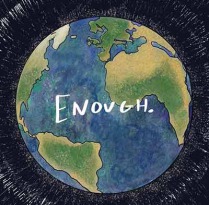
ENOUGH!
I wrote an article in Spring 2000 entitled “How Much is Enough?” I am reprinting it here because I would write the same thing today. When Clifford and I began our website in 1996 we called it “Raventalk: For a Sustainable Planet Future.” We featured an image of a gleeful little girl standing on the palm of her dad’s hand. The caption was, “Is the Joy of Being on your palm-top?” Here’s my article. You can see the image in the bottom right column of
my newsletter
SPRING 2000: What does the “joy of being” have to do with a sustainable planet future? Let’s first look at what I mean by each of those ideas. The “joy of being” is a spiritual quality. You feel good about yourself. You feel a sense of connectedness and belonging. You feel a sense of purpose and meaning in your life. There is freedom, play, delight and wonder. There is happiness that has nothing to do with money or position. In spite of difficulties and crises, you are essentially glad to be alive,
A “sustainable planet future” is the idea that the way we live on Earth allows us and future generations to live in harmony with all living beings, and with the ecological systems of the planet. It means we live as part of the loop and circle of life. We use and reuse. We do not overuse. We spend within our means. We put back what we take out. We share resources with every living being that lives on this planet with us. We recognize the biological and ecological systems that we are a part of, and live in balance with those laws.
Abundant evidence is available now to show us that we are exhausting the Earth’s resources and living in such a way that destroys the ecological balance of the Earth. We in industrialized nations consume far more than our fair share of resources. The consequences of social imbalance are as potentially explosive and disastrous as the consequences of global warming and climate change. A sustainable planet future envisions environmental and social justice for all.
Do we ever feel we have enough? Are we ever enough just as we are? We are constantly being prodded, lured, enticed, and driven to consume by the feeling that we don’t have enough, or that we are not enough as we are. Advertisements work on our fears, self-doubt, dissatisfaction and sense of insufficiency. We buy to stave of those feelings. We buy to fix what we think is wrong with us. We consume material goods to address every sort of need, be it physical, emotional, intellectual or spiritual.
Thus we live way beyond the planet’s capabilities of supporting us. If every person on the planet consumed the way we in the industrialized countries do, it would take four planets to sustain us. We have separated ourselves from natural systems. We know, but are not accepting, ecological realities. We have chosen to be superior to Nature. We have chosen to place a man-made system—the economy—before natural systems. Our economy, and the idea of endless growth—instead of the ecology of the planet—is running our lives. Our current growth economy depends on consuming the very things we need to survive. Contrary to what our government and corporate leaders tell us, growth is not synonymous with progress. Our industrial economies—and that includes the development of the global economy (“globalization”)—grow at the expense of ecosystems, culture, communities and democracy. That was what the demonstrations at the WTO in Seattle in 1999 were all about.
So let’s stop this runaway train that’s rushing toward a brick wall. Let’s look at what’s really important to us. Let’s take a close & truthful look at the consequences of how we are living. What are the real costs to our every action? If all costs were calculated in our Gross Domestic Product, we would not be looking at an economic boom, but ecological doom. GDP does not measure nonmaterial goods and services. It does not measure quality of life or natural resources or pollution. Fortunately, a different measuring system is already in use called The Genuine Progress Indicator.
So what does the joy of being have to do with our sustainable planet future? Doesn’t it seem to you that if people were happy (with basic needs met, meaningful work, leisure time, a peaceful inner life) the planet would not be in distress? Doesn’t it follow that if we work on ourselves, we will ease the stress in our own lives, and the health of the planet will also be restored? We and the planet are one. Let’s work on ourselves and save the planet at the same time.
NOVEMBER 2021: I would add that we also need to demand action from our leaders on every environmental and social issue of our time!
SPRING 2000: What does the “joy of being” have to do with a sustainable planet future? Let’s first look at what I mean by each of those ideas. The “joy of being” is a spiritual quality. You feel good about yourself. You feel a sense of connectedness and belonging. You feel a sense of purpose and meaning in your life. There is freedom, play, delight and wonder. There is happiness that has nothing to do with money or position. In spite of difficulties and crises, you are essentially glad to be alive,
A “sustainable planet future” is the idea that the way we live on Earth allows us and future generations to live in harmony with all living beings, and with the ecological systems of the planet. It means we live as part of the loop and circle of life. We use and reuse. We do not overuse. We spend within our means. We put back what we take out. We share resources with every living being that lives on this planet with us. We recognize the biological and ecological systems that we are a part of, and live in balance with those laws.
Abundant evidence is available now to show us that we are exhausting the Earth’s resources and living in such a way that destroys the ecological balance of the Earth. We in industrialized nations consume far more than our fair share of resources. The consequences of social imbalance are as potentially explosive and disastrous as the consequences of global warming and climate change. A sustainable planet future envisions environmental and social justice for all.
Do we ever feel we have enough? Are we ever enough just as we are? We are constantly being prodded, lured, enticed, and driven to consume by the feeling that we don’t have enough, or that we are not enough as we are. Advertisements work on our fears, self-doubt, dissatisfaction and sense of insufficiency. We buy to stave of those feelings. We buy to fix what we think is wrong with us. We consume material goods to address every sort of need, be it physical, emotional, intellectual or spiritual.
Thus we live way beyond the planet’s capabilities of supporting us. If every person on the planet consumed the way we in the industrialized countries do, it would take four planets to sustain us. We have separated ourselves from natural systems. We know, but are not accepting, ecological realities. We have chosen to be superior to Nature. We have chosen to place a man-made system—the economy—before natural systems. Our economy, and the idea of endless growth—instead of the ecology of the planet—is running our lives. Our current growth economy depends on consuming the very things we need to survive. Contrary to what our government and corporate leaders tell us, growth is not synonymous with progress. Our industrial economies—and that includes the development of the global economy (“globalization”)—grow at the expense of ecosystems, culture, communities and democracy. That was what the demonstrations at the WTO in Seattle in 1999 were all about.
So let’s stop this runaway train that’s rushing toward a brick wall. Let’s look at what’s really important to us. Let’s take a close & truthful look at the consequences of how we are living. What are the real costs to our every action? If all costs were calculated in our Gross Domestic Product, we would not be looking at an economic boom, but ecological doom. GDP does not measure nonmaterial goods and services. It does not measure quality of life or natural resources or pollution. Fortunately, a different measuring system is already in use called The Genuine Progress Indicator.
So what does the joy of being have to do with our sustainable planet future? Doesn’t it seem to you that if people were happy (with basic needs met, meaningful work, leisure time, a peaceful inner life) the planet would not be in distress? Doesn’t it follow that if we work on ourselves, we will ease the stress in our own lives, and the health of the planet will also be restored? We and the planet are one. Let’s work on ourselves and save the planet at the same time.
NOVEMBER 2021: I would add that we also need to demand action from our leaders on every environmental and social issue of our time!
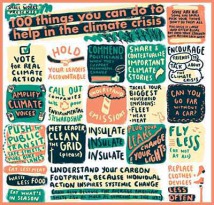
CLIMATE SOLUTIONS TO ACT ON
The science about climate change is clear. The evidence is here. The solutions to reduce CO2 emissions abound. The path to creating a thriving life for all beings and the planet is before us. If we want that we must act now.
Here are the best sources for climate action that I have found:
100 Things You Can Do to Help in the Climate Crisis
This is an excellent list of things everybody and anybody can do.
1309 Solutions presented by the Solar Impulse Foundation
Explore these solutions and realize there can be no more excuses to put off climate action with blah blah blah.
Project Drawdown
A Comprehensive plan to drawdown CO2: Solutions and information
Regeneration.org
"The World’s largest, most complete listing and network of solutions to the climate crisis. And how to do them."
Here's what Regeneration writes:
“Regeneration is a radical new approach to the climate crisis, one that weaves justice, climate, biodiversity, and human dignity into a seamless tapestry of action, policy, and transformation that can end the climate crisis in one generation. It is the first book to describe and define the burgeoning regeneration movement spreading rapidly throughout the world.
Our concern is simple: most people in the world remain disengaged, and we need a way forward that engages the majority of humanity. Regeneration is an inclusive and effective strategy compared to combating, fighting, or mitigating climate change. Regeneration creates, builds, and heals. Regeneration is what life has always done, we are life, and that is our focus. It includes how we live and what we do—everywhere. We have a common interest and that interest can only be served when we come together.”
And for those who continue to deny or doubt climate change think of this:
“The good thing about science is that it's true whether or not you believe in it.” Neil deGrasse Tyson
What are we waiting for? Our time starts now.
Here are the best sources for climate action that I have found:
100 Things You Can Do to Help in the Climate Crisis
This is an excellent list of things everybody and anybody can do.
1309 Solutions presented by the Solar Impulse Foundation
Explore these solutions and realize there can be no more excuses to put off climate action with blah blah blah.
Project Drawdown
A Comprehensive plan to drawdown CO2: Solutions and information
Regeneration.org
"The World’s largest, most complete listing and network of solutions to the climate crisis. And how to do them."
Here's what Regeneration writes:
“Regeneration is a radical new approach to the climate crisis, one that weaves justice, climate, biodiversity, and human dignity into a seamless tapestry of action, policy, and transformation that can end the climate crisis in one generation. It is the first book to describe and define the burgeoning regeneration movement spreading rapidly throughout the world.
Our concern is simple: most people in the world remain disengaged, and we need a way forward that engages the majority of humanity. Regeneration is an inclusive and effective strategy compared to combating, fighting, or mitigating climate change. Regeneration creates, builds, and heals. Regeneration is what life has always done, we are life, and that is our focus. It includes how we live and what we do—everywhere. We have a common interest and that interest can only be served when we come together.”
And for those who continue to deny or doubt climate change think of this:
“The good thing about science is that it's true whether or not you believe in it.” Neil deGrasse Tyson
What are we waiting for? Our time starts now.
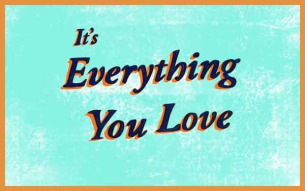
EVERYTHING YOU LOVE
"Climate change is not about climate. It's about everything you love." This is the concluding statement by Dr. Dan Dolderman in his TED Talk at the University of Toronto. He opens with a poignant story of how much his son loves certain sea creatures, species which may soon become extinct. If we think about everything we love we can all probably acknowledge that someone, or some thing, or some species, or some place is, has been, or will be adversely affected by climate change.
Instead of thinking about global warming, which can seem like a vague scientific observation, let's think instead in terms of cleaning up our air and water, and seriously addressing the causes of pollution.
Let's think instead about how to protect communities against the threats of oil leaks from pipelines that go under major waterways like the Missouri River, or the communities which are most harmed by environmental degradation.
Let's think instead about cleaning up the toxic waste produced by the practices of big agriculture which put tons of pesticides and chemical fertilizers on crops that poison the soil and pollute the groundwater.
Let's think in terms of cleaning up the tons of plastic in our oceans and landfills by regulating the plastic producers.
Let's think in terms of educational programs about reducing food waste, and waste in general, which are major sources of methane emissions.
Let's think in terms of restoring a true democracy so that corporations and billionaires are not calling the shots.
Let's think in terms of how we can consume less of the Earth's resources so that everyone will still have enough of what we need, and learn to be happy with less stuff. Remember Eleanor Roosevelt's famous motto: "Use it up. Wear it out. Make it do. Do without."
If we think, and act, on these things, the climate will take care of itself, and the Earth will continue to take care of us.
Instead of thinking about global warming, which can seem like a vague scientific observation, let's think instead in terms of cleaning up our air and water, and seriously addressing the causes of pollution.
Let's think instead about how to protect communities against the threats of oil leaks from pipelines that go under major waterways like the Missouri River, or the communities which are most harmed by environmental degradation.
Let's think instead about cleaning up the toxic waste produced by the practices of big agriculture which put tons of pesticides and chemical fertilizers on crops that poison the soil and pollute the groundwater.
Let's think in terms of cleaning up the tons of plastic in our oceans and landfills by regulating the plastic producers.
Let's think in terms of educational programs about reducing food waste, and waste in general, which are major sources of methane emissions.
Let's think in terms of restoring a true democracy so that corporations and billionaires are not calling the shots.
Let's think in terms of how we can consume less of the Earth's resources so that everyone will still have enough of what we need, and learn to be happy with less stuff. Remember Eleanor Roosevelt's famous motto: "Use it up. Wear it out. Make it do. Do without."
If we think, and act, on these things, the climate will take care of itself, and the Earth will continue to take care of us.
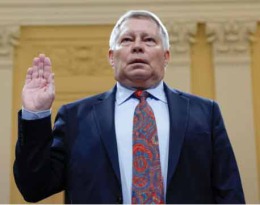
At the June 16 hearing of the House Select Committee to Investigate the January 6th Attack on the U.S. Capitol retired federal judge J. Michael Luttig, a leading Republican conservative, said,
"Donald Trump and his allies and supporters are a clear and present danger to American democracy."
Below I quote Jessica Craven, the author of Chop Wood. Carry Water who speaks about the dangers to our democracy if Democrats do not retain the House and gain seats in the Senate in the midterm elections. This is imperative because we are now seeing with great clarity that the Republican Party is not “for” democracy.
What’s at stake
“The rise or fall of our democracy will have global consequences. Should it end, the repercussions will leave no one untouched. We can flee to another country, but we won’t be able to escape the devastating climate consequences, the emboldening of strongmen everywhere, the increased danger to marginalized communities, the weakening of democracy in every stronghold. We’re not just fighting for our country, in other words. We’re fighting to save the world as we know it.”
“The whole fight is ours. Whether we know it or not, every American is now conscripted in a battle for the life of our democracy. Those who are ignoring what’s happening or choosing to tune it out will, alas, be no less affected by the outcome than we will. Their inaction is aiding the opposition. If you know people like this please find ways to make them aware of the stakes and get them involved if you can. This is a massively historical moment, and you’re in the center of it. . . . You’re also the reason we’ll win. Never forget it.”
Words of advice: She encourages everyone to stay rested. “It’s hard to take downtime when the country is in an even greater uproar than usual, but one has to try. Remember to breathe. Remember to stay in the day. Remember to focus on simple actions.” She continues, “Remember, fear will tell us to give up. If we do, then we are indeed doomed. Faith, on the other hand, is nothing more than actions taken despite fear. Despite the feeling that we’re too small, the problems are too big, the scale of change needed is too overwhelming. Faith is an action. And in taking action we find over and over again that our fears were wrong all along.”
"Donald Trump and his allies and supporters are a clear and present danger to American democracy."
Below I quote Jessica Craven, the author of Chop Wood. Carry Water who speaks about the dangers to our democracy if Democrats do not retain the House and gain seats in the Senate in the midterm elections. This is imperative because we are now seeing with great clarity that the Republican Party is not “for” democracy.
What’s at stake
“The rise or fall of our democracy will have global consequences. Should it end, the repercussions will leave no one untouched. We can flee to another country, but we won’t be able to escape the devastating climate consequences, the emboldening of strongmen everywhere, the increased danger to marginalized communities, the weakening of democracy in every stronghold. We’re not just fighting for our country, in other words. We’re fighting to save the world as we know it.”
“The whole fight is ours. Whether we know it or not, every American is now conscripted in a battle for the life of our democracy. Those who are ignoring what’s happening or choosing to tune it out will, alas, be no less affected by the outcome than we will. Their inaction is aiding the opposition. If you know people like this please find ways to make them aware of the stakes and get them involved if you can. This is a massively historical moment, and you’re in the center of it. . . . You’re also the reason we’ll win. Never forget it.”
Words of advice: She encourages everyone to stay rested. “It’s hard to take downtime when the country is in an even greater uproar than usual, but one has to try. Remember to breathe. Remember to stay in the day. Remember to focus on simple actions.” She continues, “Remember, fear will tell us to give up. If we do, then we are indeed doomed. Faith, on the other hand, is nothing more than actions taken despite fear. Despite the feeling that we’re too small, the problems are too big, the scale of change needed is too overwhelming. Faith is an action. And in taking action we find over and over again that our fears were wrong all along.”
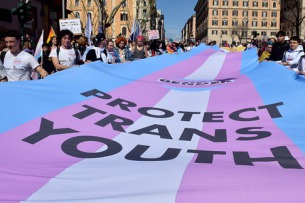
I have reprinted an essay by Dan Rather entitled "Stop it!"
He describes the urgent necessity of standing up for marginalized people, particularly trans youth, who are being viciously attacked by the extremists of our country. Peoples' lives and our democracy are at stake.
From Dan Rather . . . "STOP IT!"
We are facing many threats and challenges to our nation’s prosperity and security. These include a belligerent China, the war in Ukraine, economic disruption, our global climate crisis, and even the specter of artificial intelligence, just to name a few.
These are the issues government should be debating and legislating.
And yet Republican statehouses and Fox News would have you believe our greatest threat is drag queen reading hour.
It’s meant to be a divisive distraction.
It's lunacy, but it is also a dangerous injustice. And a tragedy.
You can tell a lot about a society by how it treats its most vulnerable, marginalized, and ostracized.
History is replete with the horrors inflicted by those who wielded the power of position and privilege against those who had little to none of either. Persecution has taken many forms — legal, cultural, economic, and social. It has led to unimaginable suffering, violence, and death — even reaching the scale of genocide.
About this, there are many lessons from the past to be heeded. Divisive hatred should be called out and rebuffed. And it is especially incumbent on those outside the group being persecuted to stand in meaningful solidarity. An attack against one segment of society is an attack against all whose existence might challenge a narrow definition of what is considered “acceptable.”
Right now, few groups face more direct hostility than the transgender community. There is a wave of animus sweeping the nation. It is being codified into law, wielded as invective, and used as a springboard to violence.
This divisiveness and scapegoating pose a threat to our ideals. And thus they are a threat to all who care about freedom in a pluralistic constitutional republic based on the principles of democracy.
More fundamentally, those under attack are fellow human beings who deserve the same respect and opportunity to live their lives as anyone else.
There are a lot of reasons bigots are focusing their hatred on transgender people. Gender fluidity is a concept foreign to how many were raised, and thus it can be disorienting to comprehend. It challenges the binary many of us learned as children and believed to be utterly fundamental.
“What did you have?” is often the first question new mothers are asked from family and friends. And the implications of the query are understood even if they go unstated: Did you have a boy or a girl?
It is also understood that the implications of that question will endure far beyond infancy. Gender is seen as portentous for what the rest of life will entail. There was a time when biological sex determined everything from one’s likely occupation to one’s legal rights. Boys and girls have different aisles in toy stores and sections in clothing departments.
In many ways, we have made progress toward gender equality. We have women in positions of political power and leading businesses. We have women firefighters, police officers, and pilots. But we also still have a ways to go. And the recent rollback of abortion rights shows we are capable of losing ground.
Into all of this complexity comes the rise in trans awareness and its backlash. While it is understandable that children and adults who do not fit into a traditional gender overlay could be a challenging reality for many, we should be clear that this makes it all the more important that we try to understand.
Science informs us that gender is often a blurry concept in nature. History proves that transgender identities in humans are not new. We can gain understanding from medical and mental health professionals about responding with care and empathy.
And we should be clear that claims of “this is abhorrent,” “this isn’t how things should be done,” “this isn’t natural,” or “this is dangerous” are the kind of rhetoric long used to attack the “other,” no matter who it may be.
We have seen these attacks lobbed at other members of the LGBTQ community. We have seen them target interracial marriage, the customs of non-Christians, and communities of immigrants.
We have seen discrimination wielded time and again as a cudgel for those with power to bolster their standing by picking on others. It is bullying, pure and simple.
The attacks on drag queens and others in transgender communities as “groomers” or prone to child abuse are particularly despicable. There is no evidence backing these allegations. And those who push them are often conveniently quiet about those who have been prosecuted for abuse but belong to groups more aligned with conservative values, like the clergy, Boy Scouts, and even Republican politics (former House Speaker Dennis Hastert comes to mind).
The purpose of these attacks on the trans community is transparent. It’s about political power, and a power built on division. It’s about picking on those who have the least ability to defend themselves, including and especially children.
We can try to wrestle in good faith around the implications of a changing society. We can discuss what this might mean for sports or bathroom design. We can be sympathetic to those who are still early in their journey of understanding.
But as history has shown, we should not be quiet. We should not look the other way. We should not allow this hatefulness to take root and distract us from the real problems with which we must contend.
Those who are being targeted must know that they are not alone.
He describes the urgent necessity of standing up for marginalized people, particularly trans youth, who are being viciously attacked by the extremists of our country. Peoples' lives and our democracy are at stake.
From Dan Rather . . . "STOP IT!"
We are facing many threats and challenges to our nation’s prosperity and security. These include a belligerent China, the war in Ukraine, economic disruption, our global climate crisis, and even the specter of artificial intelligence, just to name a few.
These are the issues government should be debating and legislating.
And yet Republican statehouses and Fox News would have you believe our greatest threat is drag queen reading hour.
It’s meant to be a divisive distraction.
It's lunacy, but it is also a dangerous injustice. And a tragedy.
You can tell a lot about a society by how it treats its most vulnerable, marginalized, and ostracized.
History is replete with the horrors inflicted by those who wielded the power of position and privilege against those who had little to none of either. Persecution has taken many forms — legal, cultural, economic, and social. It has led to unimaginable suffering, violence, and death — even reaching the scale of genocide.
About this, there are many lessons from the past to be heeded. Divisive hatred should be called out and rebuffed. And it is especially incumbent on those outside the group being persecuted to stand in meaningful solidarity. An attack against one segment of society is an attack against all whose existence might challenge a narrow definition of what is considered “acceptable.”
Right now, few groups face more direct hostility than the transgender community. There is a wave of animus sweeping the nation. It is being codified into law, wielded as invective, and used as a springboard to violence.
This divisiveness and scapegoating pose a threat to our ideals. And thus they are a threat to all who care about freedom in a pluralistic constitutional republic based on the principles of democracy.
More fundamentally, those under attack are fellow human beings who deserve the same respect and opportunity to live their lives as anyone else.
There are a lot of reasons bigots are focusing their hatred on transgender people. Gender fluidity is a concept foreign to how many were raised, and thus it can be disorienting to comprehend. It challenges the binary many of us learned as children and believed to be utterly fundamental.
“What did you have?” is often the first question new mothers are asked from family and friends. And the implications of the query are understood even if they go unstated: Did you have a boy or a girl?
It is also understood that the implications of that question will endure far beyond infancy. Gender is seen as portentous for what the rest of life will entail. There was a time when biological sex determined everything from one’s likely occupation to one’s legal rights. Boys and girls have different aisles in toy stores and sections in clothing departments.
In many ways, we have made progress toward gender equality. We have women in positions of political power and leading businesses. We have women firefighters, police officers, and pilots. But we also still have a ways to go. And the recent rollback of abortion rights shows we are capable of losing ground.
Into all of this complexity comes the rise in trans awareness and its backlash. While it is understandable that children and adults who do not fit into a traditional gender overlay could be a challenging reality for many, we should be clear that this makes it all the more important that we try to understand.
Science informs us that gender is often a blurry concept in nature. History proves that transgender identities in humans are not new. We can gain understanding from medical and mental health professionals about responding with care and empathy.
And we should be clear that claims of “this is abhorrent,” “this isn’t how things should be done,” “this isn’t natural,” or “this is dangerous” are the kind of rhetoric long used to attack the “other,” no matter who it may be.
We have seen these attacks lobbed at other members of the LGBTQ community. We have seen them target interracial marriage, the customs of non-Christians, and communities of immigrants.
We have seen discrimination wielded time and again as a cudgel for those with power to bolster their standing by picking on others. It is bullying, pure and simple.
The attacks on drag queens and others in transgender communities as “groomers” or prone to child abuse are particularly despicable. There is no evidence backing these allegations. And those who push them are often conveniently quiet about those who have been prosecuted for abuse but belong to groups more aligned with conservative values, like the clergy, Boy Scouts, and even Republican politics (former House Speaker Dennis Hastert comes to mind).
The purpose of these attacks on the trans community is transparent. It’s about political power, and a power built on division. It’s about picking on those who have the least ability to defend themselves, including and especially children.
We can try to wrestle in good faith around the implications of a changing society. We can discuss what this might mean for sports or bathroom design. We can be sympathetic to those who are still early in their journey of understanding.
But as history has shown, we should not be quiet. We should not look the other way. We should not allow this hatefulness to take root and distract us from the real problems with which we must contend.
Those who are being targeted must know that they are not alone.
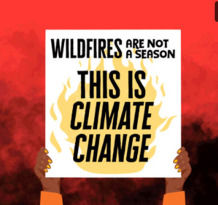
HOPE AND HEAT
The hottest summer ever recorded is happening in places all over the world. All of us are feeling the heat and yet politicians who seek power above all else are ignoring the deadly effects of climate change.
Many have lost hope that we can pull out of this downward spiral. Yet, as it is often said, "Hope is action." Here are a couple of quotes relevant to hope, heat and optimism, as well as my own thoughts about hope.
"What’s done is done. Immense damage has been perpetrated by many who still seek to wield power over our country. The danger they pose cascades like the danger they helped unleash. We bake in part because of their bad faith. But all of us bear some responsibility. Especially those who have lived the longest.
"Human activity helped cause the crisis. But human ingenuity can help fix it. If we don’t have some hope amidst the heat, much more will be lost." —Dan Rather
"When you do nothing you feel overwhelmed and powerless. But when you get involved you feel the sense of hope and accomplishment that comes from knowing you are working to make things better."
—Maya Angelou
Paul Hawken is the founder of Project Drawdown, which has dozens of solutions to drawdown our carbon emissions. He said, "When asked if I am pessimistic or optimistic about the future, my answer is always the same: If you look at the science about what is happening on earth and aren’t pessimistic, you don’t understand data. But if you meet the people who are working to restore this earth and the lives of the poor, and you aren’t optimistic, you haven’t got a pulse. What I see everywhere are ordinary people willing to confront despair, power, and incalculable odds in order to restore some semblance of grace, justice, and beauty to this world" ~ Paul Hawken
Peronsally, I am probably more pessimistic than optimistic, and perhaps less hopeful than not. BUT, it doesn't matter, because whether or not I have hope doesn't change that I will do everything I can to focus on this issue, make people aware of the crisis, and join with others who are dong the same.
How about you?
Many have lost hope that we can pull out of this downward spiral. Yet, as it is often said, "Hope is action." Here are a couple of quotes relevant to hope, heat and optimism, as well as my own thoughts about hope.
"What’s done is done. Immense damage has been perpetrated by many who still seek to wield power over our country. The danger they pose cascades like the danger they helped unleash. We bake in part because of their bad faith. But all of us bear some responsibility. Especially those who have lived the longest.
"Human activity helped cause the crisis. But human ingenuity can help fix it. If we don’t have some hope amidst the heat, much more will be lost." —Dan Rather
"When you do nothing you feel overwhelmed and powerless. But when you get involved you feel the sense of hope and accomplishment that comes from knowing you are working to make things better."
—Maya Angelou
Paul Hawken is the founder of Project Drawdown, which has dozens of solutions to drawdown our carbon emissions. He said, "When asked if I am pessimistic or optimistic about the future, my answer is always the same: If you look at the science about what is happening on earth and aren’t pessimistic, you don’t understand data. But if you meet the people who are working to restore this earth and the lives of the poor, and you aren’t optimistic, you haven’t got a pulse. What I see everywhere are ordinary people willing to confront despair, power, and incalculable odds in order to restore some semblance of grace, justice, and beauty to this world" ~ Paul Hawken
Peronsally, I am probably more pessimistic than optimistic, and perhaps less hopeful than not. BUT, it doesn't matter, because whether or not I have hope doesn't change that I will do everything I can to focus on this issue, make people aware of the crisis, and join with others who are dong the same.
How about you?

Climate Solutions to Act On
The science about climate change is clear. The evidence is here. The solutions to reduce CO2 emissions abound. The path to creating a thriving life for all beings and the planet is before us. If we want that we must act now. Here are the best sources for climate action that I have found:
100 Things You Can Do to Help in the Climate Crisis
This is an excellent list of things everybody and anybody can do.
1309 Solutions presented by the Solar Impulse Foundation
Explore these solutions and realize there can be no more excuses to put off climate action with "blah blah blah."
Project Drawdown
A Comprehensive plan to drawdown CO2: Solutions and information
Regeneration.org
"The World’s largest, most complete listing and network of soltions to the climate crisis. And how to do them."
100 Things You Can Do to Help in the Climate Crisis
This is an excellent list of things everybody and anybody can do.
1309 Solutions presented by the Solar Impulse Foundation
Explore these solutions and realize there can be no more excuses to put off climate action with "blah blah blah."
Project Drawdown
A Comprehensive plan to drawdown CO2: Solutions and information
Regeneration.org
"The World’s largest, most complete listing and network of soltions to the climate crisis. And how to do them."